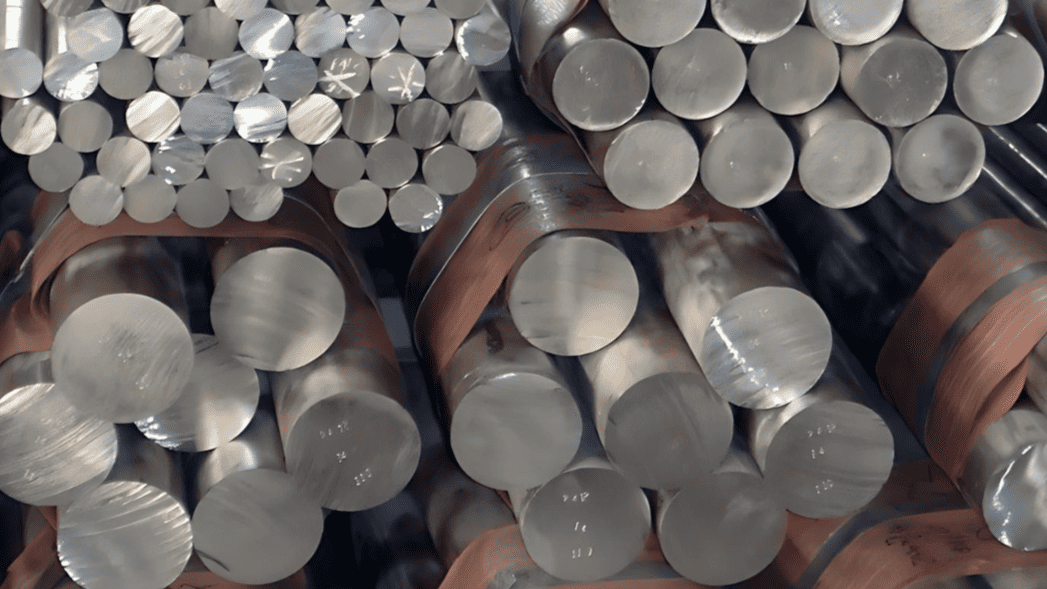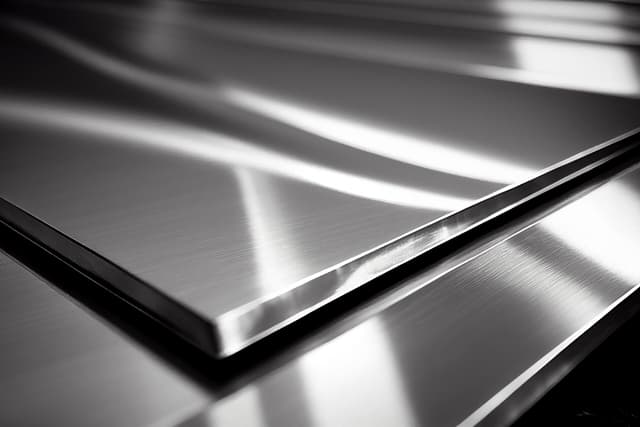17-4PH Stainless Steel : Properties, Equivalent, Heat Treatment, & Composition
17-4PH Stainless Steel (AISI 630 / UNS S17400) is a precipitation-hardening martensitic grade known for its high strength, excellent corrosion resistance, and versatility in heat treatment. Widely used in aerospace, marine, chemical, and engineering industries, it offers a perfect balance of performance and cost-efficiency.

17-4PH Stainless Steel : Properties, Equivalent, Heat Treatment, & Composition
17-4PH stainless steel is a high-performance precipitation-hardening (PH) alloy valued for its exceptional combination of strength, corrosion resistance, and toughness. Also designated as AISI 630 or UNS S17400, this versatile material is a cornerstone in demanding industries where mechanical integrity cannot be compromised. Its unique properties are achieved through a carefully controlled heat treatment process, allowing its microstructure to be tailored for specific engineering requirements.
This martensitic stainless steel offers excellent resistance to corrosive environments while maintaining mechanical properties superior to many standard austenitic grades. Its reliability makes it a primary choice for critical components in aerospace, chemical processing, marine, and power generation sectors. Nifty Alloys LLC is a premier supplier of this advanced material, providing certified products that meet stringent international standards.
To learn more or request a quote for your specific application, visit our 17-4PH Stainless Steel Product Page.
What is 17-4PH Stainless Steel?
17-4PH stainless steel is a chromium-copper precipitation-hardening stainless steel alloy. The "17-4" designation refers to its approximate composition of 17% chromium and 4% nickel. The "PH" signifies its key characteristic: precipitation hardening. This is a heat treatment technique used to increase the yield strength of malleable materials.
The process involves heating the alloy to a specific temperature to dissolve copper-rich precipitates into the steel's matrix (solution annealing) and then cooling it. A subsequent aging treatment at a lower temperature causes these fine particles to "precipitate" or re-form within the metal's grain structure. This internal structure effectively impedes dislocations, significantly increasing the material's strength and hardness. The primary alloying elements—chromium, nickel, and copper—work together to provide this unique blend of high strength, good toughness, and reliable corrosion resistance, making the grade UNS S17400 a standout performer.
Chemical Composition of 17-4PH (AISI 630 / UNS S17400)
The precise chemical balance of 17-4PH stainless steel is fundamental to its performance. Each element is carefully controlled to ensure consistent mechanical properties and predictable behavior during fabrication and heat treatment.
Element | Content (%) |
Chromium (Cr) | 15.0 – 17.5 |
Nickel (Ni) | 3.0 – 5.0 |
Copper (Cu) | 3.0 – 5.0 |
Manganese (Mn) | ≤ 1.0 |
Silicon (Si) | ≤ 1.0 |
Columbium (Cb) + Tantalum (Ta) | 0.15 – 0.45 |
Carbon (C) | ≤ 0.07 |
Phosphorus (P) | ≤ 0.04 |
Sulphur (S) | ≤ 0.03 |
Iron (Fe) | Balance |
Key Elemental Contributions:
- Chromium (Cr): The primary element responsible for corrosion resistance. It forms a passive, protective oxide layer on the steel's surface.
- Nickel (Ni): Enhances toughness, ductility, and contributes to the martensitic structure after heat treatment.
- Copper (Cu): The key element for precipitation hardening. During aging, copper-rich precipitates form, providing a significant increase in strength.
- Columbium (Cb) / Niobium (Nb): Acts as a grain refiner and forms stable carbides, which helps maintain strength at elevated temperatures and improves weldability.
- Carbon (C): A low carbon content is maintained to improve weldability and prevent the formation of brittle chromium carbides, which could reduce corrosion resistance.
Mechanical Properties of 17-4PH Stainless Steel
The mechanical properties of 17-4PH stainless steel are a direct function of its heat treatment condition. By altering the aging temperature and duration, engineers can achieve a wide spectrum of strength and hardness levels. The following table provides typical values for material aged to its highest strength condition, H900.
Property | Value (Typical) |
Tensile Strength | Up to 1310 MPa (190 ksi) |
Yield Strength (0.2% Offset) | Up to 1170 MPa (170 ksi) |
Hardness | Up to 44 HRC (Condition H900) |
Elongation at Break | 10–20% |
Modulus of Elasticity | 200 GPa (29,000 ksi) |
Density | 7.75 g/cm³ (0.280 lb/in³) |
It is crucial to note that while condition H900 provides maximum strength, other conditions like H1025, H1075, and H1150 offer increased ductility and toughness at the expense of some hardness. This allows you to select a material condition that precisely matches the demands of your application. For detailed guidance on material selection, you can explore resources on Precipitation Hardening Grades.
Heat Treatment and Hardness Conditions
The versatility of 17-4PH stainless steel comes from its response to heat treatment. The process typically starts with solution annealing (Condition A), where the material is heated to approximately 1040°C (1900°F) and then rapidly cooled. In this state, the material is relatively soft and machinable. Subsequent aging treatments create the final desired properties.
- Condition H900: The material is aged at 482°C (900°F) for one hour. This produces the highest strength and hardness, typically around 44 HRC. It is ideal for applications requiring maximum wear resistance and strength.
- Condition H1025: Aged at 552°C (1025°F), this condition offers a balanced combination of high strength, good toughness, and improved stress corrosion cracking resistance compared to H900.
- Condition H1150: By aging at a higher temperature of 621°C (1150°F), the material achieves maximum toughness and ductility, although strength and hardness are reduced. This condition is specified for applications where impact resistance and fracture toughness are critical.
The ability to tailor these properties makes 17-4PH a highly adaptable engineering material. Machining is typically performed in Condition A before the final hardening process to minimize tool wear and simplify fabrication.
Physical Properties of 17-4 PH
The physical properties of UNS S17400 are consistent across its various heat-treated conditions, ensuring predictable performance in thermal and electrical applications.
Property | Value |
Density | 7.75 g/cm³ |
Melting Point | 1400°C – 1450°C |
Thermal Conductivity | 18 W/m·K at 300°C |
Electrical Resistivity | 0.8 µΩ·m at 20°C |
Magnetic Permeability | Yes, 17-4PH is magnetic |
Its magnetic properties are a result of its martensitic microstructure, which is retained after heat treatment. This is an important consideration for applications where magnetic interference must be avoided.
17-4PH Stainless Steel Applications
The exceptional strength-to-weight ratio, excellent corrosion resistance, and dimensional stability of 17-4PH make it a preferred material for critical components across numerous industries.
- Aerospace: Used for landing gear components, structural aircraft parts, shafts, and turbine blades where high strength and fatigue resistance are essential.
- Marine: Ideal for propeller shafts, fasteners, and offshore rigging due to its superior performance in saltwater environments.
- Valves and Pumps: Components such as pump shafts, impellers, and valve stems benefit from its combination of corrosion and wear resistance.
- Chemical Processing: Equipment exposed to corrosive chemicals, including reactors and mixing shafts, relies on the durability of 17-4PH.
- Power Generation: Specified for fasteners, turbine parts, and other components in both nuclear and conventional power plants.
- Food Processing: Used for machinery parts that require both high strength and corrosion resistance to withstand frequent cleaning cycles.
The grade’s ability to be heat-treated to precise specifications allows it to meet the diverse and stringent requirements of these high-stakes applications.
Advantages of 17-4PH Stainless Steel
Choosing 17-4PH provides several distinct engineering advantages:
- High Strength-to-Weight Ratio: Delivers performance comparable to high-strength carbon steels with the added benefit of corrosion resistance.
- Excellent Corrosion Resistance: Its performance is comparable to 304 stainless steel in many environments, offering reliable protection against atmospheric and chemical corrosion.
- Customizable Properties: Heat treatment allows for a wide range of mechanical properties, enabling precise material specification.
- Good Machinability and Weldability: Can be readily machined in the annealed condition and welded using standard methods, simplifying fabrication.
- Cost-Effective Performance: Offers a high-performance alternative to more expensive nickel-based superalloys in moderately high-temperature and corrosive applications.
- Limitations of 17-4PH Stainless Steel
While highly versatile, 17-4PH has some operational limitations that must be considered during material selection:
- Reduced Toughness at Cryogenic Temperatures: The material can become brittle at very low temperatures, making it unsuitable for certain cryogenic applications.
- Limited High-Temperature Service: Its strength begins to decrease at service temperatures above 315°C (600°F), limiting its use in high-heat environments.
- Susceptibility to Stress Corrosion Cracking (SCC): In the higher strength conditions (like H900), it can be susceptible to SCC in warm chloride environments. Using overaged conditions like H1150 improves SCC resistance.
17-4 PH material equivalent
17-4PH stainless steel is recognized globally under various standards, ensuring its availability and interchangeability for international projects.
Standard | Grade |
AISI | 630 |
UNS | S17400 |
ASTM | A564 / A693 / A705 |
DIN | 1.4542 |
EN | X5CrNiCuNb16-4 |
JIS | SUS630 |
Knowing these equivalents is vital for procurement engineers and project managers sourcing materials for projects with global supply chains.
Comparison – 17-4PH vs 15-5PH
A close relative to 17-4PH is 15-5PH stainless steel. While compositionally similar, 15-5PH is manufactured using a different melting process (vacuum-arc remelting), which results in a more refined microstructure. This gives 15-5PH improved transverse toughness and ductility.
- Strength: 17-4PH generally offers slightly higher strength and hardness, particularly in the H900 condition.
- Toughness: 15-5PH exhibits superior toughness, especially in the transverse direction, making it suitable for larger cross-sections where multi-directional stresses are a concern.
- Weldability: Both are weldable, but the refined structure of 15-5PH can offer some advantages in weld integrity.
For a deeper analysis, refer to our comparison of 15-5PH Stainless Steel.
Machinability and Welding
17-4PH is most effectively machined in its solution-annealed (Condition A) state. Its machinability is similar to that of 304 stainless steel. After machining, the component can be aged to the desired hardness. Machining in a hardened condition is possible but more challenging and requires slower speeds and more rigid tooling.
This alloy is weldable by common fusion and resistance methods. Pre-heating is generally not required. For optimal mechanical properties in the weld joint, it is recommended to perform a post-weld heat treatment. This typically involves solution annealing the welded part, followed by an aging treatment to restore the desired strength and hardness across the entire component.
Corrosion Resistance
17-4PH stainless steel offers excellent corrosion resistance, generally comparable to Grade 304 in most media. It withstands corrosive attacks in many chemical, petroleum, paper, and food processing environments. Its resistance to stress corrosion cracking is superior to standard martensitic grades like 410, especially in overaged conditions (H1025 and higher). The material provides robust performance in marine environments, though it may be subject to crevice corrosion in stagnant seawater.

This article will help you understand the fundamentals of stainless steel grades and make an informe...

This article provides a comprehensive outlook on steel price trends for 2026. We will examine the fa...

Density determines weight, and weight dictates everything from structural integrity to logistical fe...

Stainless steel is one of the most widely utilized materials in modern engineering and construction,...

Elevate Your Projects with
with
 Our Superior Steels
Our Superior Steels





